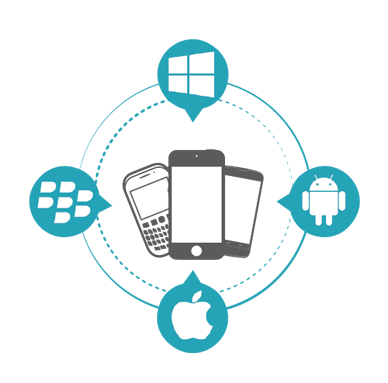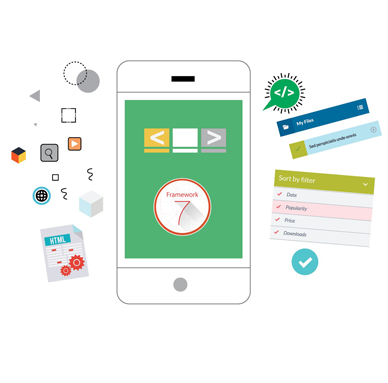Since your clients and customers will be opting to use any of a variety of platforms on their devices, we promote Hybrid Application development, which provides the optimal solution to the challenge of designing an application with cross-platform functionality. It is not only cost effective when compared to native applications, but also scalable and easy to maintain.

Hybrid mobile applications are built in a similar manner as websites. Both use a combination of technologies like HTML, CSS, and JavaScript. However, instead of targeting a mobile browser, hybrid applications target a WebView hosted inside a native container. This enables them to do things like access hardware capabilities of the mobile device.
Today, most hybrid mobile applications leverage Apache Cordova, a platform that provides a consistent set of JavaScript APIs to access device capabilities through plug-ins, which are built with native code. As a side note, Apache Cordova originally started as a project named PhoneGap. These days, PhoneGap exists as a distribution of Apache Cordova that includes additional tools. For more context about this history, check out PhoneGap, Cordova, and what's in a name?
These plug-ins include APIs for accessing the device's accelerometer, contacts, camera, and more. There is also a number of plug-ins that are built and maintained by the developer community at-large. These can be found in the Apache Cordova Plugins Registry. A curated subset of these plug-ins that have been throughly tested, documented, and extended can also be found at the Verified Plugins Marketplace.

Hybrid mobile applications provide a way for developers to re-use their existing skills in web development. Developers don't like the prospect of getting locked into proprietary platforms. This includes the programming languages and SDKs provided by platform vendors (more on this later).
Hybrid mobile application development looks appealing to an organization's bottom line. Why hire a developer for each platform when you can hire one developer and target all of them through HTML, CSS, and JavaScript? Well, the reality is a bit more complicated.
Yes, it's true that hybrid mobile application development enables developers to target more than one platform. However, each platform comes with a set of caveats when it comes to its web runtime or WebView. This is especially true with Android, which is inconsistent between OS versions.
Moreover, there might be unique capabilities of platforms to which a developer may wish to target. In those instances, a combination of plugins and platform-specific code must be utilized in order to take advantages of those capabilities. Alternatively, developers can take advantage of 3rd party web runtimes like Crosswalk that can be embedded in your hybrid app.

Before committing to a platform strategy, it's important to evaluate the technical and non-technical merits of hybrid versus alternatives like web and native – especially as it relates to your mobile application's requirements. For example:
These and other questions are worth asking before embarking upon development of a mobile application. To elaborate on this, let's examine a few of these questions in more detail.
Initially, when mobile app development was a novel idea, it was preferred to develop mobile apps native. However, with the growth in mobile users, app usage, and device fragmentation, they have come to realize the benefits of multi platform application development. Hybrid mobile apps, necessarily, fall in the middle of the native and web app spectrum. They manifest the user experience properties of both native and web, providing a variety of sublime benefits like: